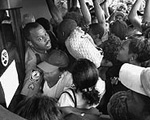 Supply and demand is the bedrock of economics, the balance of which ensures cosmic order and more importantly, efficient allocation of scarce resources. But the problem with supply and demand is that sometimes the demand cannot afford the supply. This is where Mugabe Efficiency Theory comes in. In it, when supply is too dear, government fiat is needed to make it priced where demand can buy it. Problem solved, supply and demand clearly balanced and the cosmos is once again in order.
Supply and demand is the bedrock of economics, the balance of which ensures cosmic order and more importantly, efficient allocation of scarce resources. But the problem with supply and demand is that sometimes the demand cannot afford the supply. This is where Mugabe Efficiency Theory comes in. In it, when supply is too dear, government fiat is needed to make it priced where demand can buy it. Problem solved, supply and demand clearly balanced and the cosmos is once again in order.Zimbabweans are shopping like there's no tomorrow. [In] the aisles of Harare's electrical shops,...the widescreen TVs were the first things to go, for as little as £20. Across the country, shoes, clothes, toiletries and different kinds of food were all swept from the shelves as a nation with the world's fastest...economy gorged itself on one last spending spree.
Car dealers said...that a car costing £15,000 could be had for £30[.]
President Robert Mugabe's order that all shop prices be cut by at least half, and sometimes several times more, has forced stores to open to hordes of customers waving thick blocks of...money given new value by the price cuts. The police and groups of ruling party supporters could be seen leading the charge for a bargain.
...
The impact of the price cuts was felt almost immediately as fuel virtually disappeared from sale after garages were forced to sell petrol for 23p a litre, less than they paid the state-owned supplier.
The so-called "charge for a bargain" is exactly the kind of thing that will stimulate demand into consuming supply and ensure the economy is in a Mugabe Optimal state. If demand could not afford the supply, then the universe would probably implode making Mugabe Efficiency an important policy issue for all those who would prefer for existence to continue.
Economists say the price cuts will only deepen the national crisis, leaving many shops bare because they will not be able to afford to restock while official retail prices remain lower than the cost of buying wholesale or importing. Mr Mugabe has dismissed such warnings as "bookish economics".
Recommendation: We see no downside to Mugabe Efficiency Theory. If things are made more affordable by force, then more people can and will buy them. This will in turn grow the economy and spur production of....uhm....uhhhh...hmmm
HT to the undervalued Newmark's Door.